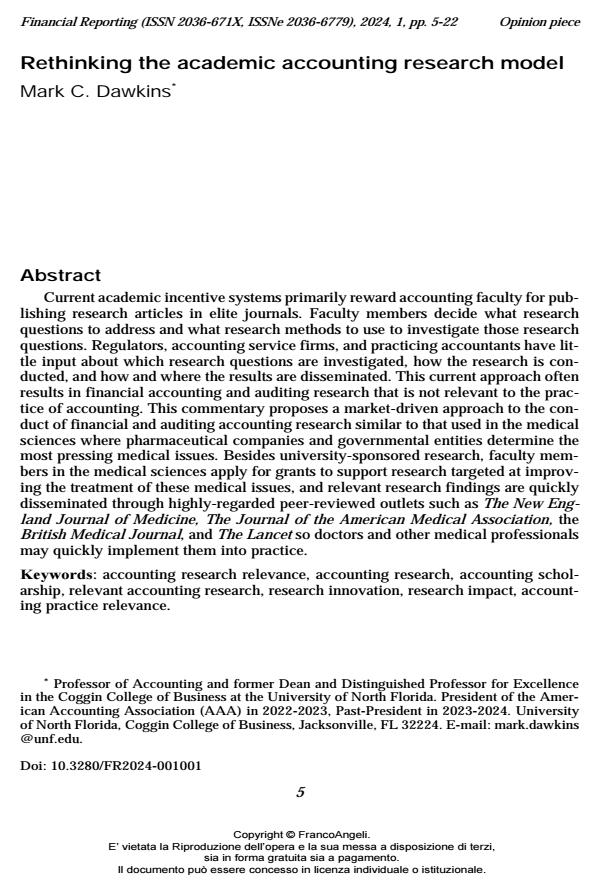Rethinking the academic accounting research model
Journal title FINANCIAL REPORTING
Author/s Mark C. Dawkins
Publishing Year 2024 Issue 2024/1
Language English Pages 18 P. 5-22 File size 81 KB
DOI 10.3280/FR2024-001001
DOI is like a bar code for intellectual property: to have more infomation
click here
Below, you can see the article first page
If you want to buy this article in PDF format, you can do it, following the instructions to buy download credits

FrancoAngeli is member of Publishers International Linking Association, Inc (PILA), a not-for-profit association which run the CrossRef service enabling links to and from online scholarly content.
Current academic incentive systems primarily reward accounting faculty for publishing research articles in elite journals. Faculty members decide what research questions to address and what research methods to use to investigate those re-search questions. Regulators, accounting service firms, and practicing accountants have little input about which research questions are investigated, how the research is conducted, and how and where the results are disseminated. This current ap-proach often results in financial accounting and auditing research that is not rele-vant to the practice of accounting. This commentary proposes a market-driven approach to the conduct of financial and auditing accounting research similar to that used in the medical sciences where pharmaceutical companies and govern-mental entities determine the most pressing medical issues. Besides university-sponsored research, faculty members in the medical sciences apply for grants to support research targeted at improving the treatment of these medical issues, and relevant research findings are quickly disseminated through highly-regarded peer-reviewed outlets such as The New England Journal of Medicine, The Journal of the American Medical Association, the British Medical Journal, and The Lancet so doctors and other medical professionals may quickly implement them into practice.
Keywords: accounting research relevance, accounting research, accounting schol-arship, relevant accounting research, research innovation, research impact, ac-counting practice relevance.
Jel codes: M41
- The Composition and Use of Journal Lists: A Survey of AACSB Accounting Accredited Programs Benedikt M. Quosigk, Donald L. Ariail, Steven W. Smalt, in Issues in Accounting Education /2025 pp.87
DOI: 10.2308/ISSUES-2024-016 - A change in the research paradigm in corporate reporting? Some reflections on the role of the accounting academia Araceli Mora, in FINANCIAL REPORTING 1/2025 pp.5
DOI: 10.3280/fr202519345
Mark C. Dawkins, Rethinking the academic accounting research model in "FINANCIAL REPORTING" 1/2024, pp 5-22, DOI: 10.3280/FR2024-001001